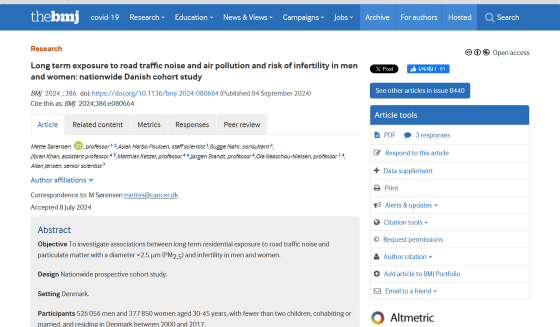In previous research,Noise from cars and transportationbutvarious health hazardsto bring about,air pollutionis known to have a negative effect on human lifespan. A Danish study looking at the link between these problems and infertility found that exposure to air pollution and traffic noise was not only associated with increased infertility, but each may affect men and women differently. It turns out.
Long term exposure to road traffic noise and air pollution and risk of infertility in men and women: nationwide Danish cohort study | The BMJ
https://www.bmj.com/content/386/bmj-2024-080664
A new study has linked traffic noise and pollution to infertility – but the effects differed for men and women
https://theconversation.com/a-new-study-has-linked-traffic-noise-and-pollution-to-infertility-but-the-effects-differed-for-men-and-women-238223
At the time of writing the article, the world population1 in 6 peopleis estimated to be affected by infertility, and it is important to understand the effects of various factors on infertility. In modern society, more than half of the population lives in urban areas, so there is a theory that living in cities with problems with air and noise has some effect on infertility.
When humans inhale chemicals from contaminated air, they can travel to the genitals through the blood. These chemicals disrupt hormone secretion and directly damage eggs and sperm.reduce fertilityThere is a possibility that it will. Although the effect of traffic noise on fertility is unclear, some studies suggest that noiseIncreases secretion of stress hormonesIt has been suggested that it may lead to changes in fertility.
A Danish research team therefore investigated how people’s exposure to air pollution and traffic noise affects infertility. In Denmark, each citizen is assigned a unique personal identification number, and data such as address, job, educational background, and family structure is stored in a national database.
Based on this database, the research team identified people who were “30 to 45 years old,” “cohabiting or married,” “have fewer than two children,” and “residing in Denmark between January 1, 2000 and December 31, 2017.” Men and women who met the following conditions were selected as a group with a high possibility of trying to become pregnant. From this, we excluded people who were diagnosed with infertility before the age of 30, people who live alone, and people who are registered in a same-sex partnership, resulting in 377,850 women and 526,056 women. The man remained.
We then analyzed records of whether the patient had been diagnosed with infertility and detailed information on where they lived, collected from Denmark’s national patient database. The analysis examines the level of road traffic noise and air pollution at each address;Fine particulate matter (PM2.5)It was estimated that the concentration of
The analysis revealed that 16,172 out of 526,056 men and 22,672 out of 377,850 women were diagnosed with infertility. It also found that men who were more exposed to PM2.5, which is 1.6 times higher than the concentration recommended by the WHO, had a 24% higher risk of infertility. Women, on the other hand, have an average noise level of 55-60decibelIt was found that exposure to noise levels 10.2 decibels higher than normal was associated with a 14% increased risk of infertility in people aged 35 and over.
The risk of infertility from air pollution and traffic noise was similar even after accounting for factors such as urban or rural residence, education level, and income. The findings highlight that environmental factors such as air pollution and traffic noise not only have long-term effects on infertility risk, but that these effects may differ between men and women.
It has also been pointed out that the different effects between men and women may be due to differences in sperm and egg production. The male body constantly produces sperm after puberty, so it may be that changes in the environment are more likely to have an early effect on fertility.
On the other hand, women are the source of all eggs.primordial follicleYou are born with it and it remains dormant in your body for a long time. At puberty, some of the dormant primordial follicles awaken, gradually develop, and eventually a single mature egg is ovulated. Therefore, women have control mechanisms to protect their primordial follicles from environmental changes, but prolonged exposure to stress such as noise can have negative effects.
The study does have some limitations, such as not examining biological factors such as individual hormone levels or body weight, and not all participants were screened for infertility. . Still, the study is unprecedented and represents a useful step in understanding the effects of air pollution and traffic noise on infertility in men and women.
Copy the title and URL of this article










